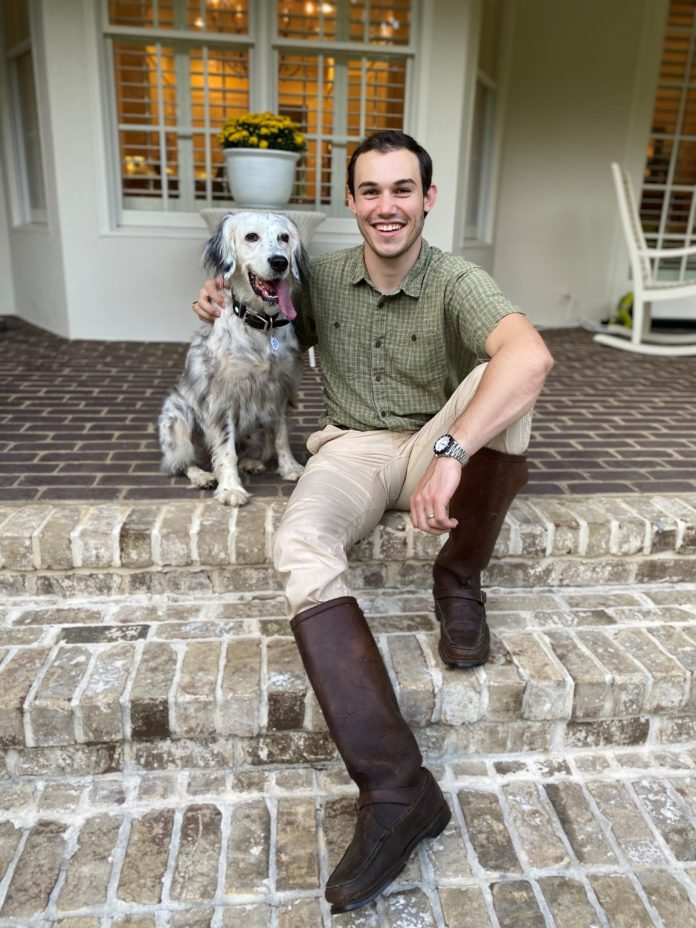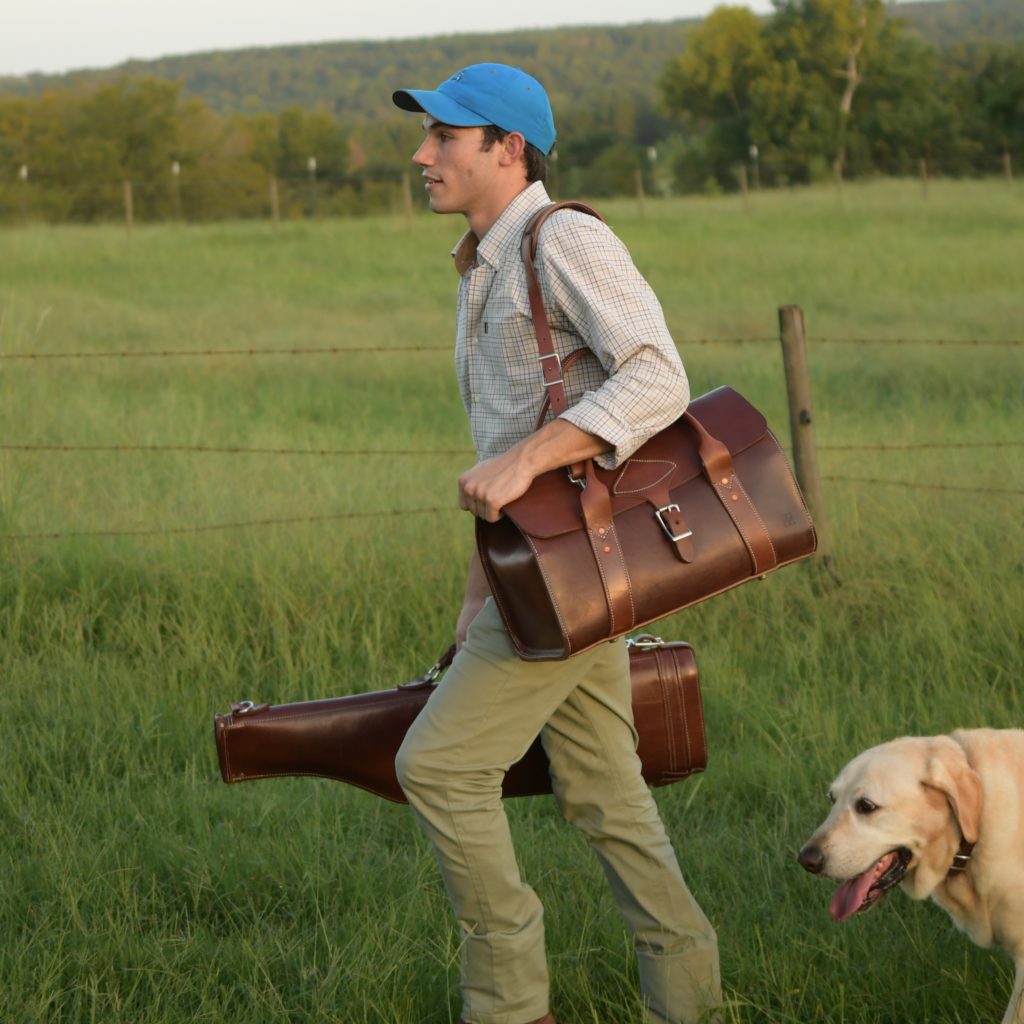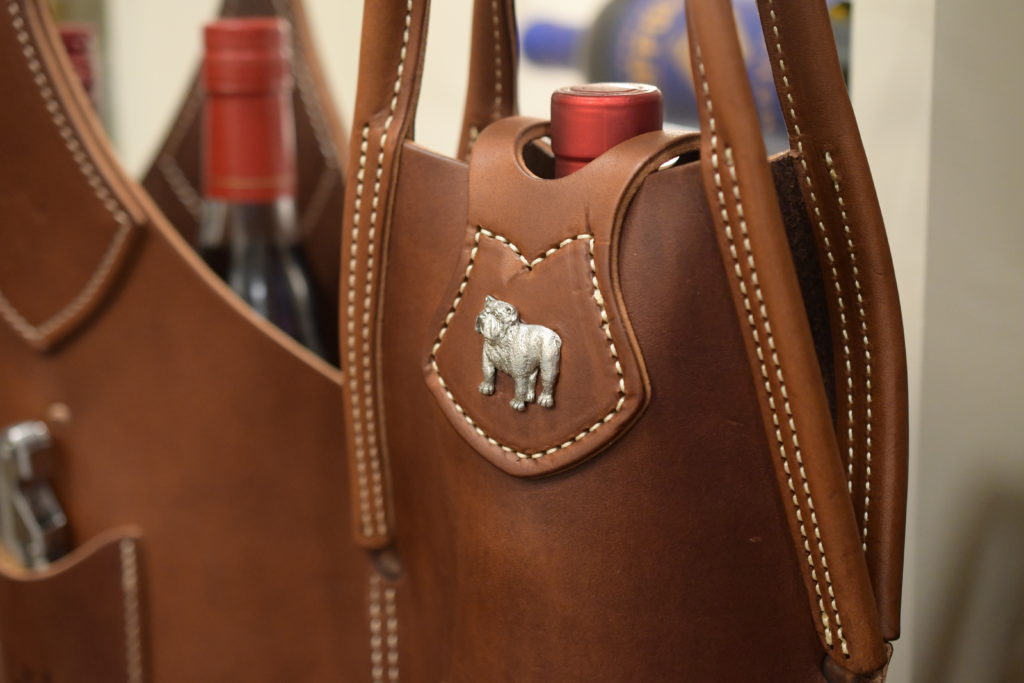
Mercer alumnus Luke Kolbie believes in “conservation through craftsmanship,” and his business Kingfisher Leatherworks is built and operated on that motto. Through a new venture as CEO of shoe company Russell Moccasin, he hopes to spread that philosophy on a larger scale while continuing a family’s legacy of long-lasting, quality products.
Kolbie, who graduated in 2021 with a finance degree, began working with leather as a hobby when he was 12. By high school, he was doing custom orders, creating a line of products, and ironing out manufacturing and distribution logistics. He kept working on his business, Kingfisher Leatherworks, while a Mercer student and was named a Company in Residence in the Mercer Innovation Center in 2018.
The company’s products include belts, wallets, weekend bags, cartridge bags and bottle totes, sold mainly online but also at some consumer trade shows and about 30 retailers nationwide.
Kolbie prototypes and creates templates for each new product, and then the items are manufactured by a family of Amish craftsmen — Merle, Raymond and Joseph Schlabach — in Illinois using leather from a U.S. supplier.
“We started with sporting bags like cartridge bags, but the wine totes have opened up a much broader and larger customer base,” he said. “The totes have become such a huge part of the business. Single and double barrel totes are half of what we do in our business. That’s really exciting to me.”
Right after graduation, Kolbie got married; moved with wife Wynne to Birmingham, Alabama, where she is pursuing a doctorate at Samford University; and took a job with a mortgage firm. A year later, Kingfisher Leatherworks had taken off, so Kolbie turned his focus to those efforts and a new opportunity from Russell Moccasin.
The 124-year-old company, based in Berlin, Wisconsin, is known for handcrafted shoes and boots that stand the test of time. World War II veteran Earl Shaffer became the first person to walk the entire Appalachian Trail in 1948, and he made the 2,000-mile trek in none other than Russell Moccasins. Four generations of Kolbie’s family have worn boots made by the company, and his grandfather still wears the pair that belonged to his father.
Kolbie said Russell Moccasin is one of a handful of companies that he modeled Kingfisher Leatherworks after over the years. The two businesses attend a lot of the same trade shows, and Kolbie was able to visit Russell’s Minneapolis factory and meet the owners in 2018. In August, Russell Moccasin’s owner, the Fabricius family, shared that they were ready to pass the torch.
Joe Julian, owner of custom woodworking business Julian & Sons, and Kolbie are now the co-owners of Russell Moccasin, with Kolbie acting as CEO.
“Joe (Julian) and I both are very passionate about Russell and want to make sure Russell is around for the next generation,” Kolbie said. “The whole process has been a very amicable one. (The Fabricius family) has been fully supportive about this and excited about the future of Russell with us involved — to me that’s the most rewarding part of this.”

Current chief operating officer Joe Gonyo will continue to oversee daily operations, while Kolbie will focus on the business model side. He’ll work on streamlining processes and products, training the next generation of craftsmen, and determining next steps. Julian will add his decades of experience managing teams of craftsmen to help set up the systems and infrastructure needed for Russell to organize its workflow.
“It’s an opportunity to take a company that’s been around for 124 years and make sure it’s around for another 124,” Kolbie said. “It’s neat to be able to be a part of a company that’s been around so long and means so much to so many people. I see it as a stewardship opportunity.”
Kingfisher Leatherworks and Russell Moccasin will remain separate companies, but there are opportunities for partnerships. For instance, Kingfisher will make accessories for Russell, and the two companies already use some of the same leathers. Both make products that are meant to last a lifetime and be passed down through generations, which goes back to their shared philosophy.
Kolbie is working to spread that idea of “conservation through craftsmanship” through a new guild of businesses. Julian & Sons, Kingfisher Leatherworks and Russell Moccasin are the first members, and the goal is to partner with other companies with similar values and provide certification opportunities.
“Just because we can make things quickly and en masse, is that enough reason for us to do that?” Kolbie said. “This is a conscious choice of businesses that are choosing to steer their business in a way that prioritizes our impact and how our products perform in the long-term.”
It’s important for companies to think about conservation practices from the beginning when making their products.
“When you are designing a product to last decades of abuse, there are always parts of that product that will need to be serviced to maintain functionality,” Kolbie said. “It’s inevitable, and even desirable. The difference between a wasteful, disposable product and a generational one is that the latter is designed to be maintained. No one would invest in a car that you couldn’t change the tires on, and when possible, you shouldn’t buy a pair of shoes that is not re-soleable or a bag that is not re-craftable.
“We need to use methods that are forward-thinking enough to anticipate the weak points that will wear out first and design products to be repairable without affecting its performance or aesthetics. That’s how you make a product that lasts generations and eliminates waste.”
For instance, the stitching of Kingfisher Leatherworks products is embossed into the leather, so the leather takes the brunt of the wear. The company also uses longer stitch lengths, so there are less holes in the leather and the material remains stronger. Then, if the stitches ever break, the same holes can be used for repair. Similarly, Russell Moccasin shoes are designed to be re-soled over and over without damaging the shoe due to their unique moccasin construction.
These kinds of methods ensure products can last for decades, generations and even thousands of miles.








